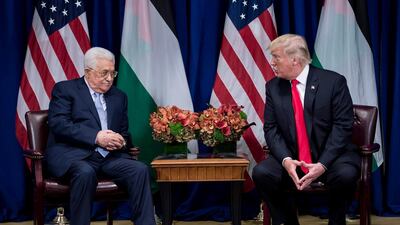Palestinian officials welcomed President Donald Trump's first public endorsement of the two-state solution on Wednesday as the US leader said he hoped to produce his long-awaited blueprint for a peace settlement to the decades-long by the end of the year.
At a meeting on the sidelines of the United Nations General Assembly, Mr Trump told Israeli Prime Minister Benjamin Netanyahu that after considering a range of options he had settled on the approach that has been the international consensus for decades.
“I like (a) two-state solution," he said. "That's what I think works best. That's my feeling. Now you may have a different feeling. I don't think so. But I think two-state solution works best.”
Sections of the Israeli right have pushed a revival of the idea of a confederation between parts of the Palestinian territories and Jordan as the basis of a deal that would carve off the areas of Israeli settlements from the rest of the West Bank.
Jared Kushner, the president's son-in-law, has been tasked with formulating the Trump package but has so far failed to publish its details.
While relations between the Palestinian leadership and the White House are at a historic nadir – Mr Trump will not meet Mahmoud Abbas this week – there was relief at his remarks in Ramallah.
However the trust deficit between the two sides is such that officials said the two state solution was the settled policy of all its partners for peace, reiterating their long-held position.
Nabil Abu Rudeineh, spokesman for Palestinian President Mahmoud Abbas, said the demand for a state based on the borders before the 1967 Arab-Israeli war and with East Jerusalem as its capital was not negotiable.
"Peace requires a two-state solution, where the state of Palestine is based on the '67 boundaries with East Jerusalem as its capital," he said. "This is the Arab and international attitude, and all final status issues need to be solved according to the international resolutions and the Arab Peace Initiative.”
Palestinians see the Trump administration as biased towards Israel. Mr Trump delivered recognition last year of Jerusalem as Israel's capital and followed up on the recognition by moving the US Embassy in Israel from Tel Aviv to Jerusalem. The Palestinians also claim the east of the city, which Israeli occupies, as the capital of an eventual state.
_______________
Read more coverage from the UN General Assembly:
UN postcard: Could the two-state solution get a new lease of life?
West wrangles with Russia and Iran over Syria reconstruction
Yemen President Abdrabu Mansur Hadi calls on world to stop Iran's interference
_______________
The US leader chaired a meeting of the UN Security Council called to address the problem of weapons proliferation challenging the world. His remarks focused on the threat posed by Iran to its neighbours and elsewhere.
“The regime is the world’s leading sponsor of terror and fuels conflict across the region and beyond,” Mr Trump said. "I ask all members of the Security Council to work with the United States to ensure the Iranian regime changes its behaviour and never acquires a nuclear bomb.”
Describing the 2015 nuclear accord that dismantled Iranian sanctions in return for concessions on its nuclear programme as a “horrible, one-sided” agreement, Mr Trump said pressure should have been sustained on Tehran. “They were in big, big trouble,” he said. “They needed cash; we gave it to them.”
The criticism did not move the European members of the Security Council, which have sought to keep Iran in the deal with special concessions. However Emmanuel Macron, the French president, warned that Iran’s proliferation of weapons was a shared concern despite the differences over the nuclear agreement.
“In the Middle East, the ballistic assistance provided to Hezbollah and Houthis is a new and alarming development and has to stop before it further destabilises a tense region,” Mr Macron told the session.
At a press conference in New York, Iranian President Hassan Rouhani described the threat of escalating US sanctions as a psychological game designed to overthrow his government and said the country would stay in the deal as long as it continued to benefit from trade access.
The US leader also lashed out at China with a claim Beijing was trying to damage his political support base after he launched a trade war. The Chinese government has placed advertisements in Midwestern American newspapers defending bilateral trade.
"Regrettably, we found that China has been attempting to interfere in our upcoming 2018 election, coming up in November, against my administration,” he said.
"They do not want me or us to win because I am the first president ever to challenge China on trade. And we are winning on trade, we are winning at every level.”


